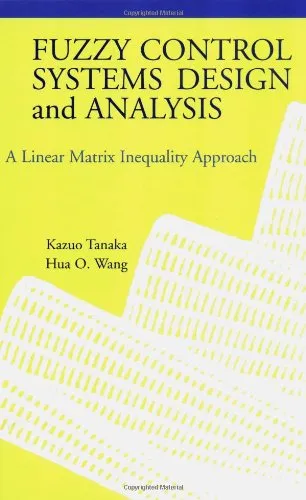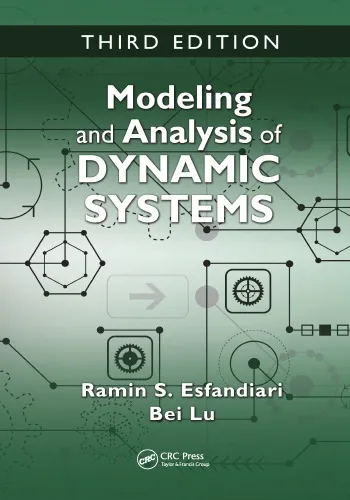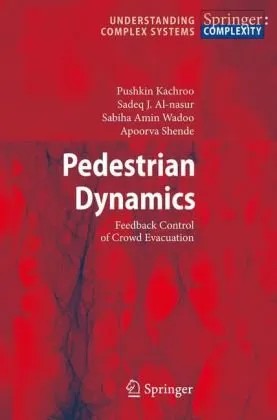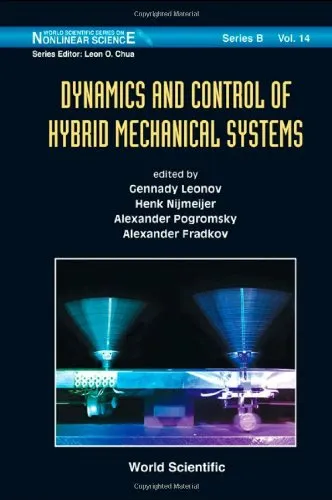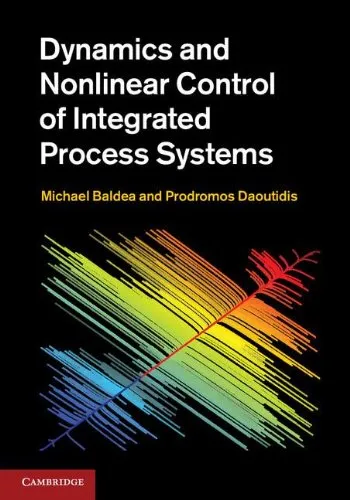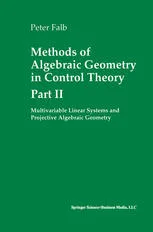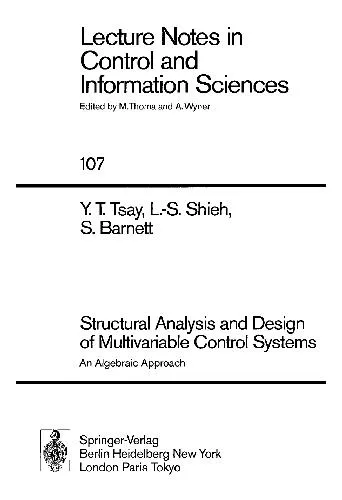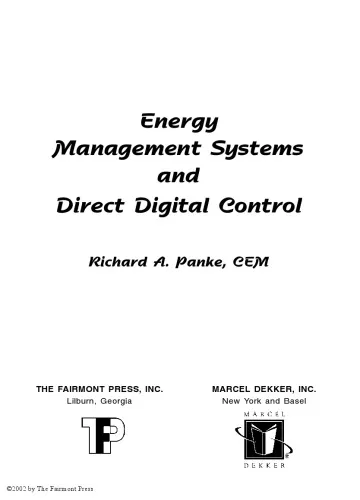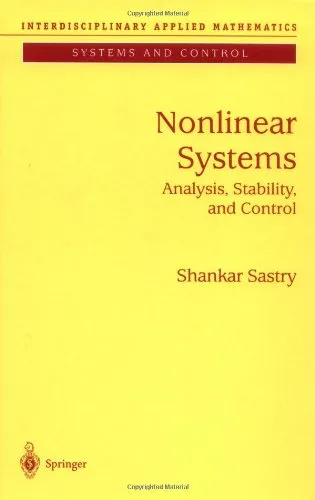Fuzzy control systems design and analysis. A linear matrix inequality approach
4.5
بر اساس نظر کاربران

شما میتونید سوالاتتون در باره کتاب رو از هوش مصنوعیش بعد از ورود بپرسید
هر دانلود یا پرسش از هوش مصنوعی 2 امتیاز لازم دارد، برای بدست آوردن امتیاز رایگان، به صفحه ی راهنمای امتیازات سر بزنید و یک سری کار ارزشمند انجام بدینکتاب های مرتبط:
معرفی کتاب 'Fuzzy Control Systems Design and Analysis: A Linear Matrix Inequality Approach'
کتاب 'Fuzzy Control Systems Design and Analysis: A Linear Matrix Inequality Approach' اثری برجسته در زمینه سیستمهای کنترل فازی است که توسط 'Kazuo Tanaka' و 'Hua O. Wang' نوشته شده است. این کتاب یک روش پیشرفته و جامع برای طراحی و تحلیل سیستمهای کنترل فازی با استفاده از رویکرد Linear Matrix Inequality را ارائه میدهد.
خلاصهای از محتوای کتاب
در این کتاب، نویسندگان به توضیح اصول و مفاهیم اصلی سیستمهای کنترل فازی پرداخته و سپس تکنیکها و راهکارهای مدرنی را برای طراحی و تحلیل این سیستمها معرفی میکنند. استفاده از رویکرد Linear Matrix Inequality یا LMI، به عنوان یک ابزار قدرتمند برای حل مسائلی چون پایداری، کنترل و بهینهسازی، به صورت ویژه در این کتاب مورد بررسی قرار گرفته است. این روش که در سالهای اخیر توجه بسیاری از محققان و مهندسان را به خود جلب کرده، موجب شده تا تحلیل سیستمهای فازی با دقت و کارایی بیشتری صورت گیرد.
نتایج کلیدی
- فراگیری اصول اساسی سیستمهای فازی و روشهای طراحی آنها.
- استفاده از Linear Matrix Inequality برای حل مسایل پیچیده در سیستمهای فازی.
- ارائه مطالعات موردی و مثالهای عملی برای درک بهتر مفاهیم.
- ارتقای درک عمیق از نظریه و کاربردهای سیستمهای کنترل فازی در دنیای واقعی.
جملات مشهور از کتاب
"کنترل فازی یک چارچوب انعطافپذیر و قدرتمند است که میتواند برای طراحی سیستمهای پیچیده با بازدهی بالا استفاده شود."
"رویکرد LMI نشان میدهد که چطور میتوان سیستمهای غیر خطی را با استفاده از شبیهسازی فازی به راحتی تحلیل و کنترل کرد."
چرا این کتاب مهم است؟
این کتاب به دلیل ارائه یک دیدگاه نوین و جامع درباره طراحی و تحلیل سیستمهای کنترل فازی یکی از منابع اصلی در این زمینه محسوب میشود. استفاده از رویکرد LMI نه تنها به پژوهشگران کمک میکند تا تئوریهای پیچیده را پیادهسازی کنند، بلکه به مهندسان اعمالی نیز کمک میکند تا سیستمهایی با بازدهی و پایداری بالا طراحی نمایند. این امر به خصوص در حوزههایی مانند رباتیک، اتوماسیون صنعتی و سیستمهای تصمیمگیری اهمیت دارد. با ارائه مثالهای عملی و مطالعات موردی، کتاب توانسته است به یک منبع آموزشی و راهنمای ارزشمند برای افراد علاقهمند به این حوزه تبدیل شود.
Welcome to an insightful journey through the innovative world of fuzzy control systems. The book "Fuzzy Control Systems Design and Analysis: A Linear Matrix Inequality Approach" by Kazuo Tanaka and Hua O. Wang provides a comprehensive exploration of fuzzy control methodologies, offering readers a robust framework for understanding and implementing advanced control strategies.
Detailed Summary of the Book
The realm of fuzzy control systems is an intricate field that blends the nuances of classical control theory with the flexibility of fuzzy logic. This book serves as a seminal piece of literature, bridging the gap between mathematical theory and practical application. It begins by introducing fundamental concepts of fuzzy logic and control, setting the stage for more complex topics. Gradually, it delves into the core subject matter: the use of Linear Matrix Inequalities (LMIs) as a powerful tool for designing and analyzing fuzzy control systems.
Tanaka and Wang systematically build upon the groundwork by exploring various aspects of stability, performance, and controller design through the lens of LMIs. The book's structured approach ensures that readers can comprehend the theoretical underpinnings while also acquiring tools that are directly applicable to real-world problems. Each chapter is fortified with illustrative examples and case studies, showcasing the application of concepts in various engineering and computational domains.
Additionally, the authors emphasize the scalability and adaptability of LMI-based fuzzy control techniques, making a solid case for their relevance in systems that require robustness and adaptability. The text is rich with empirical analysis, providing a comprehensive understanding of how these methodologies can optimize system performance amidst uncertainty and changes.
Key Takeaways
- Fuzzy logic extends traditional control theory by incorporating human-like reasoning in decision-making processes.
- Linear Matrix Inequalities offer a versatile framework for addressing stability and performance challenges in control systems.
- The book presents numerous real-world applications, demonstrating the practicality of LMI-based approaches.
- The systematic approach makes advanced concepts accessible to both students and professionals in the fields of engineering and computer science.
Famous Quotes from the Book
"Fuzzy control systems, when designed with precision and alignment, enable machines to think and adapt like humans in complex environments."
"The integration of LMIs in control design is not merely a mathematical endeavor but a gateway to unlocking unparalleled system performance and reliability."
Why This Book Matters
In an era where systems are becoming increasingly autonomous and interconnected, the demand for sophisticated control mechanisms has never been higher. "Fuzzy Control Systems Design and Analysis: A Linear Matrix Inequality Approach" is pivotal for practitioners and researchers aiming to pioneer innovations in control system technology. Its significance lies in its ability to translate complex theoretical constructs into applicable, understandable strategies.
Furthermore, the book acts as a bridge, connecting current academic research with practical engineering solutions. By demonstrating how LMI-based fuzzy control can be implemented across various industries, Tanaka and Wang not only contribute to the academic discourse but also provide actionable insights for the development of future technologies. As global industries continually evolve, this book remains a critical resource for understanding and designing advanced control systems capable of meeting modern challenges.
دانلود رایگان مستقیم
شما میتونید سوالاتتون در باره کتاب رو از هوش مصنوعیش بعد از ورود بپرسید
دسترسی به کتابها از طریق پلتفرمهای قانونی و کتابخانههای عمومی نه تنها از حقوق نویسندگان و ناشران حمایت میکند، بلکه به پایداری فرهنگ کتابخوانی نیز کمک میرساند. پیش از دانلود، لحظهای به بررسی این گزینهها فکر کنید.
این کتاب رو در پلتفرم های دیگه ببینید
WorldCat به شما کمک میکنه تا کتاب ها رو در کتابخانه های سراسر دنیا پیدا کنید
امتیازها، نظرات تخصصی و صحبت ها درباره کتاب را در Goodreads ببینید
کتابهای کمیاب یا دست دوم را در AbeBooks پیدا کنید و بخرید
1382
بازدید4.5
امتیاز0
نظر98%
رضایتنظرات:
4.5
بر اساس 0 نظر کاربران
Questions & Answers
Ask questions about this book or help others by answering
No questions yet. Be the first to ask!
